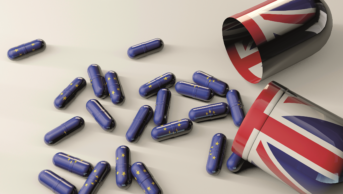
Shutterstock.com
The UK pharmaceutical industry association has warned that if the UK adopts a stand-alone medicines licensing system following the referendum vote to leave the EU, there could be significant delays to patients receiving new drugs.
At the moment, most new drugs are approved through the European Medicines Agency (EMA)’s centralised system.
“A stand-alone UK process would be the worst possible outcome and has the potential to cause significant delays in UK patients accessing the right medicines at the right time,” says Rebecca Lumsden, head of science policy at the Association of the British Pharmaceutical Industry (ABPI).
Leaving the EU may also impact medicines and pharmacovigilance legislation in the UK, she adds: “Whilst we know that a withdrawal of the UK from the EU regulatory system would lead to inevitable disruption, our goal should be for any UK system to align or integrate with established international regimes.”
The EMA, a decentralised agency of the EU, is currently located in London. A spokesperson for the agency says its future location will be a decision for the European Council and European Commission, “if it comes to it”.
The UK leaving the EU could be seen as a loss for the EMA because the Medicines and Healthcare products Regulatory Agency (MHRA), the UK’s drug regulator, undertakes a proportion of the work in appraising medicine applications for EU approval. “It’s a big share,” says the EMA spokesperson.
The EMA’s scientific committee responsible for preparing opinions on medicines in the centralised procedure is the Committee for Medicinal Products for Human Use (CHMP). The CHMP’s medicine assessment is carried out by a rapporteur and a co-rapporteur who prepare the assessment reports and lead the discussions in the committee.
In 2015, the UK was appointed as rapporteur for 22 procedures and as co-rapporteur for 17, the EMA says.
“To date, for both human and veterinary products, the UK [has been] appointed as rapporteur for 15.9% authorised and pending medicines and as co-rapporteur for 9.6% valid and pending medicines,” the EMA spokesperson says.
The UK has also played a role in drug safety in particular, through the Pharmacovigilance Risk Assessment Committee (PRAC), an EMA committee that monitors safety issues for human medicines.
The UK was appointed as PRAC rapporteur for 16.2% authorised and pending products and as PRAC co-rapporteur for 12.4% valid and pending medicines, the EMA says.
Of the agency’s 890 employees, 60 (6.6%) are British nationals. Nearly 10% of its management positions are held by British nationals, including the agency’s executive director, the deputy executive director, heads of division, heads of department and the EMA’s senior medical officers and heads of advisory functions.
“No country has ever decided to leave the EU, so there is no precedent for this situation. It is too early to foresee the implications of this decision and we will be in close contact with the EU institutions,” the EMA spokesperson adds.
Following the referendum result, the MHRA says it will continue to focus on its public health role. “Working closely with government we will consider the implications for the work of the agency,” it says.
“We will continue to make a major contribution globally to improving public health through the effective regulation of medicines and medical devices, underpinned by science and research.”
Lumsden adds that the Brexit decision creates “immediate challenges” for future investment, research and jobs.
“The [pharmaceutical] sector is already beginning to work closely with the government to take steps that minimise business uncertainty, to send a message that the UK is open [to] the world, and that we should promote innovation for a strong, competitive UK economy.”
She adds: “What we do know is that the uncertainty that does exist has had an immediate impact on the placement of both research and development and clinical research, but we will do all we can to ensure that the UK continues to be at the forefront of global science research and development for the benefit of the NHS, industry and patients.”


